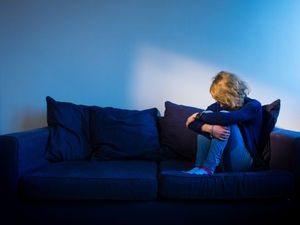Mental Health: The depths of despair – and the long road back
Mental Health Awareness Week has produced some shocking statistics about the state of the nation – in particular focusing on the effects of depression.

Deaths amongst British middle aged people in despairing situations have risen, according to a new report.
The new study into inequality by the Institute for Fiscal Studies this week reported on “deaths of despair” from suicide, drug and alcohol overdoses, and drink-related liver disease.
Deteriorating job prospects, social isolation and relationship breakdown “may slowly being taking their toll on people’s mental and physical health”, the study said.
Britain is no longer a country in which mental health is a taboo topic – and the embrace of Mental Health Awareness week demonstrates that.
Pat Johnson is the chief officer at the Sandwell African Caribbean Mental Health Foundation in West Bromwich.
“Suicide does seem to be high among the middle aged,” she says. “We have had a number of deaths of our service users and many of them have been middle aged. We know feelings of isolation and hopelessness can lead to high levels of stress, talk of ending your life and the actual act.”

Pat says there are a number of socio-economic reasons why people of this age group may be susceptible to mental health issues.
“At that age people, primarily women, might well be looking after family or parents who may be ill,” she says. “If you are a carer at the same time as working then that can be difficult and put a lot of pressure on people.
“There’s also things like looking towards retirement. People get to the point where they no longer want to work and realise their pensions pots are quite low, which is probably something that they haven’t thought about while working.
“There’s issues around affordable housing now which means that middle aged parents are supporting their children financially for longer because they can’t afford to move out.”
The focus this week has been on body image – and an environment in which 13 per cent of British adults have experienced suicidal thoughts because of concerns about their body image.
But one of the most stark statistics came from the IFS report, which said deaths caused by despair among 45 to 54-year-olds in England rose 1993 and 2017
Despair as a cause of death among women increased from 14.7 per 100,000 population in 1993 to 25.8 per 100,000 in 2017.
Among men in that age group in the same period, the figure doubled from 29.8 per 100,000 to 60.6 per 100,000.
The big issues
Pat also points the finger at austerity measures for causing more of the issues with isolation in the community, which in turn she says can contribute towards people turning to alcohol and drugs.
“Lots of youth clubs and day centres have had to close and these bring on their own issues,” she says. “People can feel socially excluded. Good wellbeing is all about being connected and feeling part of the community.”
Pat believes that investment in youth now can prevent issues further down the line.
“If you can deal with issues at a younger age then you are working on the prevention of acute illnesses later,” he said. “Saying there is a lack of resource or finances for services is a false economy because the problems just come later.”
IFS director Paul Johnson said: “I can’t think of anything more important than understanding what drives the inequalities we see today and working out what we might do to influence them.”
Clive Ireland is the chairman of Shropshire Mind, the charity that runs the Shropshire Sanctuary which was opened in 2017 and provides support at the time of need for people experiencing acute mental health crises.
“We have averted some 700 suicides since we have been running,” he says. “In April 2017 in Shropshire we had the highest section 136 in the country. That is when people are talked down from bridges and things like that and taken in by the police.
“It is disturbing seeing the figures. In Shropshire isolation and relationship breakdowns are big issues. It’s a sparse community, we have a large farming community which can be isolating, there is a lot of social and physical isolation.
“You have relationship breakdowns where previous mental health issues can be trigged by emotional episodes.”
Whatever you are going through, if you need to speak to someone then you can call the Samaritans helpline on 116 123.





